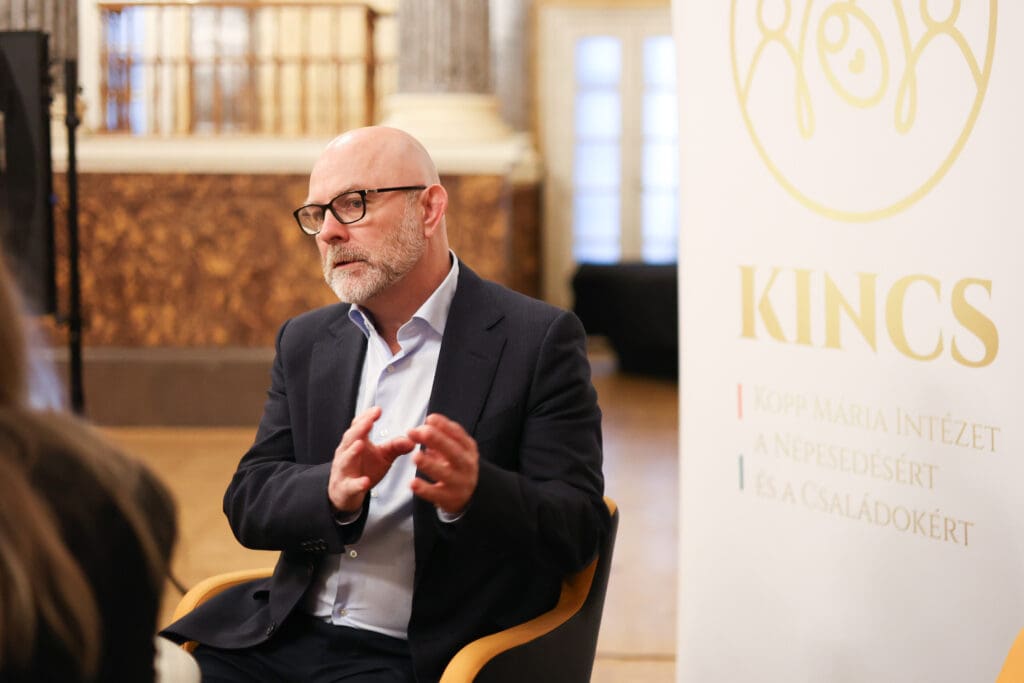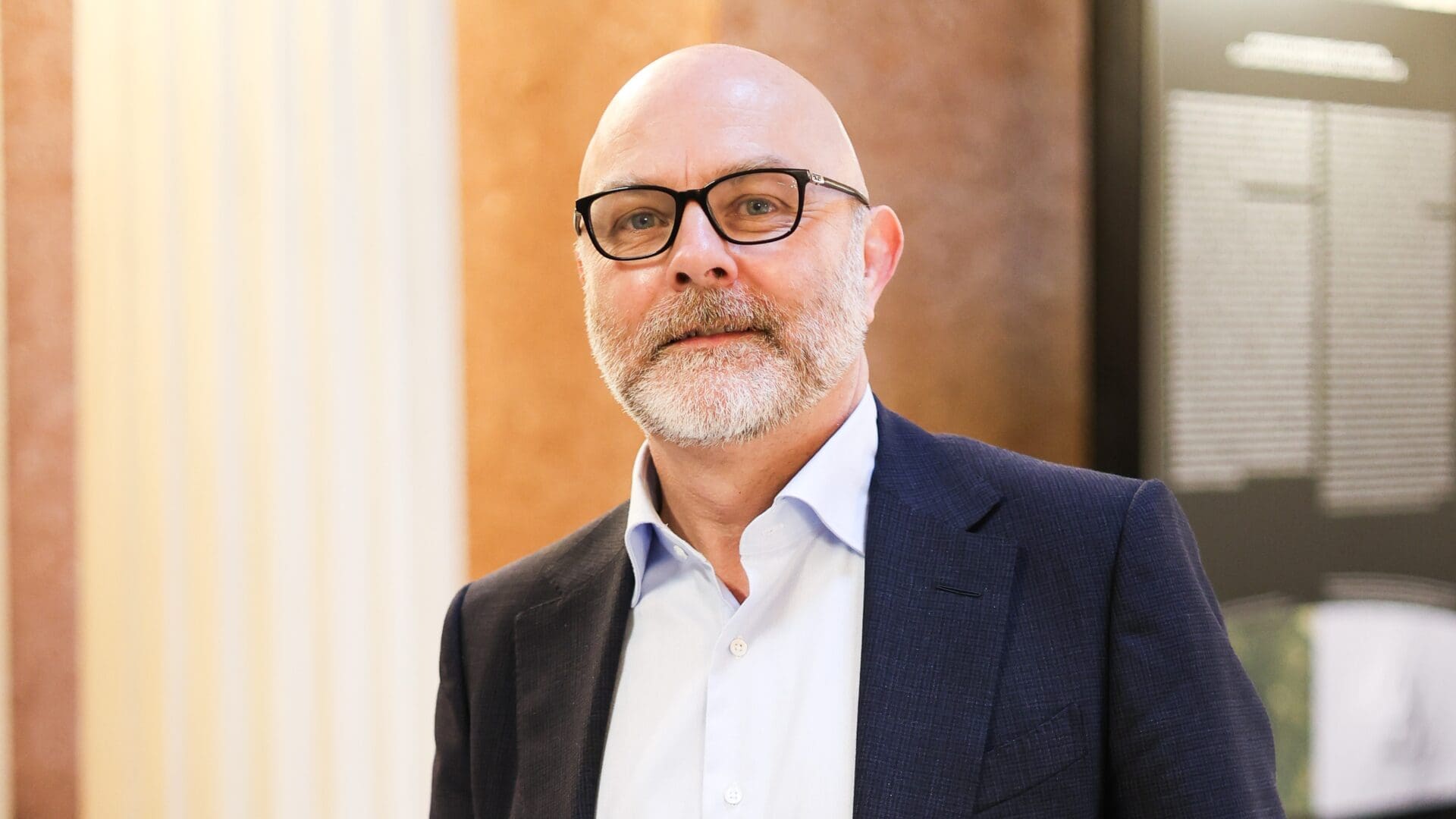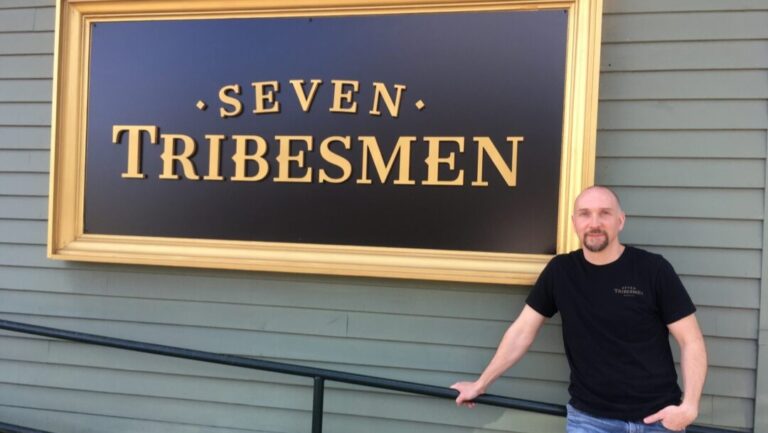Stephen J Shaw is a data scientist, demographer, filmmaker, and passionate advocate of the need to raise awareness about the devastating effects of the birthgap, a term he uses to describe a declining birth rate coupled with an increasing number of elderly citizens living longer. Originally from the UK, Mr Shaw has lived in the United States and currently resides in Japan, where he moved years ago to study the ever-growing phenomenon of unplanned childlessness. Last week Mr Shaw was in Budapest for a screening of an abbreviated version of his already world-famous documentary, Birthgap – Childless World, now also available with Hungarian subtitles. The screening, organized by the Mária Kopp Institute for Demography and Families (KINCS) at the Hungarian National Museum, was followed by an insightful presentation by Mr Shaw and a panel discussion on demographics in Hungary and the Orbán government’s initiatives aimed at helping people to have the desired number of children. We sat down with Mr Shaw after the event to find out more about his research and the challenges he faces.
***
You were invited to Hungary by the Mária Kopp Institute. Is there some kind of collaboration between you and KINCS or other NGOs or government agencies?
We don’t have a formal collaboration with the institute other than that we have agreed to do certain things together, for instance the Hungarian-subtitled version of my documentary, or this event today. KINCS has been very supportive. I also work with government agencies, local governments, for example in Japan. So that’s what I am doing these days beyond filmmaking: collaborating with government agencies and other organizations to raise awareness and I’d like to think that will continue with KINCS.
In a recent X post you remarked on anti-natalism, and how rampant and hostile it is becoming. How has anti-natalism emerged as far as you know, and is it connected with environmentalism, or fear of overpopulation, or is it the result of a combination of the two? How would you explain it?
I have reasonable recent awareness of anti-natalism as quite a force against the documentary, so I feel it, I know it today. But the history goes back a long time, and I am not fully an expert on this side. But you can trace anti-natalism to Malthus, at time when there was a belief that the resources on the planet will run out simply because of the number of people. From that time continuously there have been anti-natalist movements. There are different kinds of anti-natalism, and some people get upset with me because I group them all together, but I think it is right to do so. Anybody who encourages people to have fewer children than they want is my definition of an anti-natalist. And to answer your question about the environment, that’s just one wave; if we go back to the seventies, we will find that the main anti-natalist movement then was brought about by a concern about few resources; then we have the green revolution, when the yields of crops increased so much that people didn’t starve. And while that of course is a great thing it did not satisfy some of the same people who then said no, the environment’s the problem. Today it is the patriarchy, that women don’t really want children, it’s men forcing them to have the children. I think anti-natalism has morphed over time. Let me make one point: I see myself as generally objective, and everything I do is data-based. So it is quite a thing for me to call out people being anti-natalists or even liars, but I see it, because when you have these organizations ignoring what’s happening in South Korea or Japan, you realize they don’t care about it. All they care about is everyone having fewer children. And they don’t like sharing information about birth rates stabilizing, that we are now beyond the point where we know the world’s global population will stabilize. They don’t like that message getting out there. So anti-natalism is alive and healthy, unfortunately.
As you have alluded to it now and in your presentation today, your research is objective, and it is not about politics, because the issue affects everyone and all nations. And yet, some seem to be offended by the very subject of your research. Recently, you were invited to Cambridge University where some students attempted to stop you from speaking, which is horrible in itself. Also, last year’s Demography Summit, at which you were also a speaker, was described by POLITICO as ‘Viktor Orbán’s biannual get together of right-wing thought leaders’ and they also said that the event was ‘more about paranoia than policy.’ So why is there so much animosity and why are they trying to lump everyone who dares speak on the subject together with this imaginary far right?
So, initially, my screening at Cambridge University was cancelled. So, these protestors were successful. However, a second event was arranged, but we had to do that secretly…
Amazing.
Yes, it is amazing, isn’t it? And again, on a topic that affects everyone. So here is what I see:
the belief that women either don’t want children or it doesn’t really matter turns out to underpin many other ideologies,
political viewpoints, philosophies, and once you take that away, a lot of people feel threatened. For example, a certain brand of feminism, and I consider myself as someone who is certainly pro-education, pro-equal opportunities, pro-career for women, but some people are advocating that women just must keep earning more and more and more, and they most be equal at all cost and the fact that some women actually want to be in the home counters their argument to some extent. And there are people whom I call extinctionists, because all they ever talk about is fewer children, and many of them cloak this, because it is horrible, but some come out openly and say we don’t want any more pain or suffering, so there should be no humans. I have some level of respect for them for being at least honest. But there are others who perhaps haven’t enjoyed their lives, or don’t care for the future, or are bitter about other people having happy families, I don’t know all the reasons, who keep reminding people of having fewer children. But when we ask them when do we stop, they never give you an answer. They never say South Korea is now worrying, now they should start having more babies.

Do they feel threatened then that their whole world view or explanation for things may be put into question?
Yes, it challenges everything. A Japanese commentator said to me very recently: ‘Oh, for these people it is very inconvenient that Stephen came along.’ And it is inconvenient that this documentary is out there because they had the microphone, they had the attention of the press, of the politicians, and no one came up with evidence that people do want to have children, and no one questioned why we want to measure the environment based on fewer children, when surely it’s about resource management. So I’m an inconvenience. (laughs)
You are an inconvenience! Well, I think you can wear that as a badge of honour, many of us would say.
Thank you!
You also spoke about this argument in your presentation today, and showed the findings of a recent survey confirming it, that most young women do want children. This survey in the UK of women aged 18–35 found that a staggering percentage, 92.5 per cent said they ultimately want to have kids. But the reality is that only 60 to 70 per cent do become mothers. Which means that 30 to 40 never become mothers.
In South Korea it is over 50 per cent now. It’s actually 55 per cent.
That is frightening. So, you offered some explanations, or rather what the reasons behind this might be. And you came up with what you call unplanned childlessness. Could you explain to our readers what you mean by that?
Yes. Let me tell you a small story, it’s short. At one of the early screenings of the documentary, in the early stages of the film, in my home, I brought some friends and friends of friends to watch their reactions, as it was then that I used this term for the first time. And after the film ended there was a young American man, aged around forty. And he came up to me and he was confused, what, unplanned childlessness? And he said: that’s me! I think it resonates, because it is not that you are planning to be childless, it’s that you get to a moment in life when you realize it’s probably too late now.
So it is not about women only?
No, it is not about women only at all! I think it is quite foolish of men to think that they can wait indefinitely because they are competing with the younger versions of themselves for the same pool of women.
So, actually, as for the fertility window of women, men are in that window, too,
because they need a partner. I think men are very foolish at assuming that it doesn’t affect them. And of course there are exceptions, but usually you have to be rich and famous or in some way special to attract a much younger woman to have a child with you. So going back to the reasons behind unplanned childlessness: I used to use the term prioritization (now I prefer sequencing) and I said people’s prioritization was wrong, people focus more on education; parents, societies, they expect you to get to the best college you can, get the best education, which is important; and beyond that, while you’ve invested all that time in that, you say I need to get myself established now, because I am competing against everybody else of my age, I need to get on the ladder. And then you want the best job, and you don’t want that for only a year or two, because that won’t give you enough knowledge and experience, so you probably want to work for four or five years and then you’re thirty. Now, throughout all that time, if there is a misconception in society that it is easy to have children in your thirties, you are not even thinking about it. But when you get into your thirties, not only does the biological window close more quickly, but it also doesn’t get easier to find a partner in your thirties.

Don’t you think that these are kind of self-evident truths that all are or should be aware of? I myself was reminded of this when I was young, that my biological clock was ticking and all, and ultimately, I was fortunate enough to have a daughter, but it was not easy to find a partner, perhaps also because my expectations were too high.
I think expectations have always been high, it’s evolutionary psychology: you want to find the best partner possible; you’re driven to do that.
Well, yes, but don’t you think our parents and grandparents were in an easier position because they were often set up with someone, or they had a much more limited choice?
Well, the difference here I think is an important nuance. What’s changed is that the options available to a person are wider. We live in a world where the options seem infinite. So the underlying drive to find that best match is still there; what’s changed is the number of available options. And let me get back to my previous point: when you get into your thirties, many people get more choosy. You already have your group of friends, so that person had better like your friends and you’d better like their friends. You already know where you like to vacation; you know the hobbies you like to do, so everything must match. So what you find is that many people in their thirties are already married, so the pool is smaller, and you have all these requirements. So the pool of available people is shrinking, whereas in your twenties, finding someone to start life with, you can develop all those things together. If you carve something out together, you have something to build upon really.
It was mentioned in your documentary that governments should not interfere with how many children people should have. And that is fair enough, especially in a country like Hungary where we have a collective memory of the communist state imposing things on people. But if it is not the government that incentivizes or encourages childbearing, then who will? And isn’t it the government’s responsibility to get the word out about this issue through awareness-raising and sensitization? Are you sceptical about governments’ possibilities?
This is an important question. I think that the policies that the Hungarian government has put together benefit many, particularly those who have large families, which is a very good thing. What would be wrong is if there were coercive policies, and I am not seeing that here. I’m not. Having a child is a vulnerability, especially for women, and particularly in today’s world, where there is no guarantee that a marriage will last. So you might find yourself on your own, and you may find yourself dependent on the state in some way. So a state putting general policies together to make it possible to have that loan towards a house, such policies in Hungary, I think are actually a potential template for other nations around the world.
I hope that Hungary can keep raising awareness of this demographic crisis, and provide relevant policies
to enable people to find a solution, because then the rest of the world can look at that, and say, what Hungary has done is what we all need to do. What I don’t think is that governments simply putting money in people’s pockets to make them have more children works. And one of the reasons is that if you have a partner, it’s all very well: you’re giving me this cheque to have a child. But if I am thirty-two and I haven’t got a partner? We have seen from Scandinavia to Korea and Japan that simply putting money into things didn’t work. So, your question I guess was where do we start? What I would like to see are awareness programmes. For example, if you take high school biology textbooks, they tell you how not to have a child, but they do not tell you about the fertility window. The difficulty of becoming a mother beyond thirty needs to be in the minds of younger people so that they can make the right decisions about prioritizing. Which I said earlier I have realized was actually the wrong word, and my latest word is sequencing. People do not deprioritize children, it the issue of the sequence of when you might do these things. So, what needs to happen is empower young people with knowledge; it is all that needs to be done for this crisis of crises to start resolving itself.
But wouldn’t all this be in vain if there continues to be a value system in society which tells you that all this doesn’t really matter? You know, why have humans when the planet would be happier without us?
Well, it if was a case that people these days simply don’t want children, we would just have to accept that. But the reality is that 92 per cent actually do want children.
So it is a natural instinct that is unkillable?
It appears to be for the vast majority, yes. And that’s the reason we’ve been here for hundreds of millions of years. If it wasn’t natural, we wouldn’t be here. What I worry about is these celebrities on social media talking about all the things they do which they wouldn’t be able to do if they had children. Which is fine, having children is not for everyone. But what I’m concerned about is those types of messages getting into the minds of younger people until they are thirty-two, and then they realize, wait a minute, I do want kids, and all that was nonsense. So awareness is part of it; having policies in place that do enable people to have children, those are also good things. You want kindergartens, you want maternity benefits. But those are not enough. And there is one thing that is my hope: as there are fewer and fewer employees around, and it is harder and harder to recruit and retain staff, employers may end up saying, you know what, I am happy with you taking a five-year career break, and you can still come in and do some part-time work. Or they may allow people to start their careers when they are thirty-two, because they will still work for thirty to forty years. I think the power is shifting to younger people who will say, I want to have kids, so I’m going to find an employer that suits me; I think that is part of the solution.








